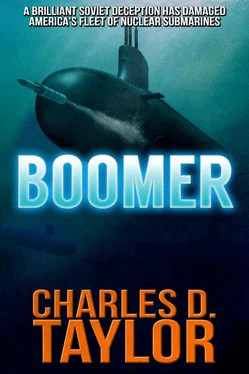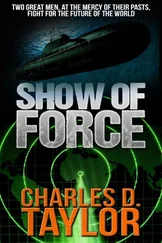That morning he had made it understood that he intended to change that system or die trying. Now he was angry because he was once again trapped by plans that he’d been forced to act upon. This time, it was the military who had insisted it be done. They contended there was no alternative. If the operation was suspended at this stage, regardless of its outcome, there never again would be such an opportunity to neutralize U.S. strategic power. Wasn’t that the reason the original plan had been devised? Neutralize the threat? At that time, the men who determined how Wayne Newell would be used also felt that the entire operation should be seen through to the end once it was enacted — no getting cold feet at a later date. It was their singular contribution to the future. Russian leaders, the General Secretary silently acknowledged, instinctively (or was it stubbornly?) stuck to such plans once they’d been formulated.
Even before he assumed the leadership, the General Secretary had developed a hatred for the overcrowded meetings so common in the Kremlin. Once it became his decision, he’d established a maximum attendance based on subject matter. Today there were only six other men in the room, still too many as far as he was concerned. His regard for the three military officers present had been decreasing over the past few days in proportion to their enthusiasm for what was now taking place in the Pacific.
The admiral in charge of submarine warfare made the mistake of holding the General Secretary’s glance for too long, and he knew there was no choice but to take the initiative. “None of us can be absolutely certain what the Americans are doing or even thinking. We’d already be aware if they could substantiate anything. But if those four American admirals are indeed in Pearl Harbor now, I’m ninety-nine percent sure they’re still in the dark about what has taken place — at least they have no more knowledge about exactly what has happened than we do. None of us can. It doesn’t matter where they are. After all, only our submarine captain really knows. We can only assume—”
“Men who assume are doomed to experience failure. This strategy originated among men who expected that our intelligence capabilities would be at least the equal of our technical abilities. So far, one half of that expectation appears to be assumption,” the General Secretary concluded acidly. “The first question I want answered is how the Americans are aware of any problem with their missile submarines at this time, if that is in fact why their senior admirals have suddenly disappeared from under our noses.”
“We should have that—” the KGB head began.
“No!” Again the General Secretary reacted angrily to his closest advisor. “You will have it if you have to expose every one of your people. Just how do you think I would react if I thought the Americans had conceived of a strategy to neutralize our seagoing ballistic-missile system? Should I immediately launch every missile at my fingertips? Should I declare war? Or perhaps I should get on my hands and knees and beg for peace at any cost?” He folded his handkerchief systematically before he again patted away the perspiration. “They absolutely must have some inkling of what has taken place, possibly more than we do, or their admirals wouldn’t disappear like this. It just may be likely that they already know more about the success or failure of this mission than we do — and that is ludicrous!” His words dripped with sarcasm. “It is more than likely that the American president knows more about the success or failure of our efforts than I do, and if he does, then he has a distinct advantage.” His eyes held those of the KGB head. “Find out what they already know. And how.”
* * *
Captain Markov responded slowly to the buzz of the phone beside his chair in the pilothouse of SSV-516. He had been dozing, oblivious to the heavy seas, and the irritating sound had been incorporated into a dream already lost to him as he reached for the instrument. Time meant nothing in the northern Pacific as the dark, gray days changed to black nights then back to dark, gray days again. Sleep came when he closed his eyes, whether he was in his bunk, on the bridge, at the dining table, or sometimes even standing, if he happened to be leaning against something. Wakefulness became a state akin to sleep, but years aboard ship had trained him to function regardless of his exhaustion.
“Captain here,” he murmured into the phone.
“Captain, it’s almost time to send another message to the American submarine.”
“Then do it.”
“But … the American reconnaissance aircraft — they could intercept our signal.”
That was correct. Those planes had completely disappeared from his mind. Maybe he wasn’t functioning as well as he used to. “How much time?”
“Thirty minutes.”
“And if they don’t receive a message in thirty minutes?”
“They would dive and wait for another three hours before attempting to copy their message traffic again.” The satellite laser transmission could reach well below the depths of normal methods, but the Russians couldn’t chance transmitting when Pasadena was deep. That could definitely compromise their entire system. So they were forced to follow the old methods.
“How critical is this message?”
“They’re all critical, Captain. If I may recall for you, our instructions indicate that other members of Pasadena’ s crew are loyal to the United States, and at a time like this we could be making a grave mistake if they had reason to doubt any little thing that’s taken place.”
“You’re correct … of course.” Captain Markov paused as SSV-516 strained to lift her bow from underneath tons of green water streaming down the forward part of the ship. She shuddered, shaking like a wet dog. “Where are the American planes now?”
“Circling, about the same range, maybe a little closer, but still out around one hundred kilometers.”
“And their chances to intercept the signal?”
“They could pick up something on their equipment, Captain. It’s almost impossible not to. But there’s no absolute reason they should know what it is or where it’s directed. After all, it is relayed to a satellite before being redirected to Pasadena .”
“But if the aircraft do receive it?”
“I don’t think they’d be able to interpret it accurately, not with the equipment they have. But they would pass it on to shore base.”
“How much should this storm affect their chances of interception?”
“Everything is affected. Captain. That’s why I can’t say.”
“There’s no reason to raise any doubt, then, with the other members of her crew. Send the message.”
Dick Makin was a realist. He anticipated the pressure that would come as XO of Pasadena when he first read his orders. That came with a career in the Navy. But he never once expected it to feel like this, not tension that you could cut with a knife. Through all his years in submarines — the equipment casualties, the emergencies, the agonizing personnel decisions — never once had he imagined that he would be questioning his own values. In his dreams he had always accepted the fact that someday he would have a command of his own and that he would be inescapably responsible for the safety of that ship and its crew. That was how he’d been trained, and it seemed natural to assume that was why Dick Makin had been put on this earth. He possessed the natural ability to assume that awesome responsibility, never once questioning that any other man in the same position wouldn’t be his equal.
As executive officer, he was the chief administrator and business manager of Pasadena, the man responsible for ensuring that the captain’s orders were carried out and that the ship was run smoothly and efficiently. Tommy Lott, as chief of the boat, was Makin’s alter ego among the crew. Together they were a team. Their respect for each other was mutual. The chief of the boat’s relationship with his captain should have been the same also. Until the last few days that had been the case within a military structure established hundreds of years before.
Читать дальше












